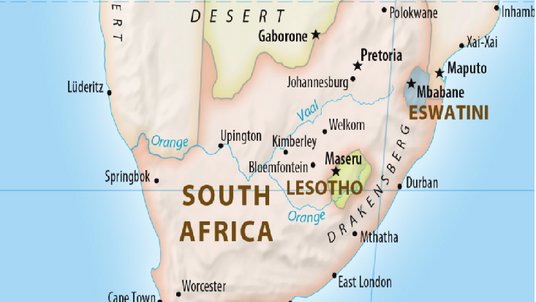
Project completed: P078_South Africa
From South to North: Comparative Microbiomes of export Produce and Indigenous Foods
Cooperating countries: South Africa and Austria
Coordinating institution: University of Pretoria, Prof. Lise Korsten, lise.korsten@up.ac.za
Partner institution: Graz University of Technology
Project duration: 1 April 2022 - 31 March 2024
Budget: EUR 19.180
Abstract:
Food security is defined by all members of a society always having access to nutritious and safe food for an active, healthy lifestyle. As such, community health is a large component of food security and focuses on the maintenance, protection, and improvement of a community´s health status. Some of the key drivers within healthy community ecosystems include ensuring that the available (produced or purchased) food is nutritious and does not pose a health risk to the consumer. To determine this, it is necessary to assess if safe food systems can be assured at a community-based level through exposure assessment, intervention, education, and awareness. By understanding the link between community health and an inclusive One Health approach, adaptive solutions can be secured.
The focus of this study will initially be on the phytomicrobiomes i.e. plant microbial community of indigenous natural fruit (marula, baobab and wild berries), vegetables (marogo, maringa and wild herbs). The comparative difference between the commercial and natural products will be studied and the impact of production systems on the unique microbiomes explored. This will be done with the view of exploring the potential of biodynamics to provide a crop protective solution for safe food production, to move away from pesticides and shift towards waste and loss reduction.
Summary:
The Wholesome Health through the Analysis of Microbiomes project focused on the phytomicrobiomes of indigenous fruits and vegetables, comparing them to commercial products to explore the impact of production systems on these unique microbiomes, potentially assess their role in reducing pesticide use and food waste. Furthermore, the project aimed to evaluate the positive or negative impacts of produce-associated microbiomes on human health.
In the first year, a study on the impact of irrigation water on food-borne pathogens in leafy greens was finalized and published in CABI Agriculture and Biosciences in September 2023. It revealed that unregulated production systems could introduce harmful pathogens like Salmonella and E. coli, impacting overall health. This work was presented at the Microbiology Society Conference (Birmingham, UK) in April 2023.
During the visit from Austrian researchers in February 2023, sampling for two additional studies was conducted. Study 2 investigated the microbiomes of marula and baobab. Despite numerous initial challenges in DNA extraction and amplification, sequencing was completed by mid-2024 with data analysis currently underway. Preliminary analysis shows distinct composition changes in the fungal community between green and ripe fruit despite similar diversity. The findings of the marula study will be presented at ISME 2024.
Study 3 focused on indigenous dried foods revealing potential health benefits but also antibiotic resistance in the bacterial isolates study. The findings of the study have thus far shown that several of the bacterial isolates have the potential to survive transmission to the human gut and were found to possess suppressive effects towards opportunistic human pathogens. This was presented at the CoE Food Safety Conference in May 2024. In the microbiome session.
Additionally, research on the phyllosphere microbiomes of blueberry plants is ongoing, exploring differences across locations and varieties in South Africa. This is part of an MSc study due for submission by the end of 2024. Thus far, DNA sequencing has been completed and the sequence analysis is in progress.
From January to June 2024, collaborative visits from the SA cohort to Graz facilitated ongoing research and strengthened partnerships. This project continues to shape research directions and foster future collaborations between the partners, e.g. enhancing the metagenomic analysis capabilities of the staff and new PhD projects for students in 2024 at the University of Pretoria, in addition to supporting fieldwork for research collaborations with TU Graz.
Project Publication
Degracious M. Kgoale, Stacey Duvenage, Erika M. Du Plessis, Jarishma K. Gokul, & Lise Korsten. (2024). Serotype Distribution, Antimicrobial Resistance, Virulence Genes, and Genetic Diversity of Salmonella spp. Isolated from small-scale Leafy Green Vegetable Supply Chains in South Africa Serotype Distribution, Antimicrobial Resistance, Virulence Genes, and Genetic Diversity of Salmonella spp. Isolated from small-scale Leafy Green Vegetable Supply Chains in South Africa. Journal of Food Protection, 87(1), 100195.
Kgoale, D. M., Gokul, J. K., Duvenage, S., Du Plessis, E. M., & Korsten, L. (2023). Profiling bacterial communities of irrigation water and leafy green vegetables produced by small-scale farms and sold in informal settlements in South Africa. CABI Agriculture and Bioscience, 4(1), 1–10. https://doi.org/10.1186/s43170-023-00176-0
Ogega, O. M., Korsten, L., Oti-Boateng, P., Odongo, D., & Thorn, J. (2024). How to transform Africa’s food system. Communications Earth & Environment, 5(1), 82–83. https://doi.org/10.1038/s43247-024-01250-9